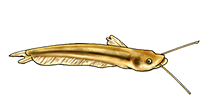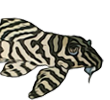About C numbers and how we can interact with them
- bekateen
- Posts: 9325
- Joined: 09 Sep 2014, 17:50
- I've donated: $40.00!
- My articles: 4
- My images: 141
- My cats species list: 145 (i:105, k:35)
- My aquaria list: 41 (i:18)
- My BLogs: 45 (i:150, p:2729)
- My Wishlist: 35
- Spotted: 183
- Location 1: USA, California, Stockton
- Location 2: USA, California, Stockton
- Contact:
 About C numbers and how we can interact with them
About C numbers and how we can interact with them
Hi All,
I'm relatively new here, and so this question may have been asked before: Is there a resource we can access that describes the various C number corys, and which provides information about why a particular C number was created?
I've tried to read up on the C numbers at several websites; I understand why C numbers exist, that C number fish may be new spp. or may belong to existing spp., but they've simply not yet been classified as such. I've also read that the C numbers depend somewhat heavily on specific capture locality info (imagine a new fish that resembles an already defined species, but it was captured outside the scientifically recognized boundaries of the know species, so we give it a C number until the issue is resolved), even though that alone is not the extent of what a C number designation includes.
I've also read that the C number system is not meant to be a "scientific" species description. And yet, I can't imagine that a fish could be given a new C number, suggesting that it might be something novel, without the original author including some details about anatomy (SVL, # rays in a fin, body dimension ratios, and the like) for others to interact with later: If by chance another person obtains a similar fish - Should that person give it a new C number or conclude that it is another specimen of a pre-existing C number?
Specifically, I'd like to know if there is a way for people who purchase "unknown" fish at a LFS (which most likely don't have locality info) to look up the C numbers for this additional info - essentially, to be able to read the original descriptions/details of each C number, to more fully compare their unknown fish to the type specimens (I use that language loosely, since as I understand them, there aren't type specimens for the C numbers on reserve in some official museum, etc.), in order to aid the fish keeper in understanding what kind of fish they have?
I ask because I recently posted (http://www.planetcatfish.com/forum/view ... 13&t=40936a photo of a new catfish I bought in a LFS. From the feedback I received, I am reasonably satisfied that my fish is probably , although I still have a grain of uncertainty (not because I suspect it's something else, but because I'd like to have stronger grounds on which to anchor my conclusions). To that end, the descriptions of c141 that I find at PC and at other catfish websites don't include any information unique to c141, to distinguish it from other known spp. or from other C numbers.
Any help you can provide would be greatly appreciated!
- Eric (Bekateen)
P.S., Unrelated to my question above, how are C numbers different from CW numbers?
I'm relatively new here, and so this question may have been asked before: Is there a resource we can access that describes the various C number corys, and which provides information about why a particular C number was created?
I've tried to read up on the C numbers at several websites; I understand why C numbers exist, that C number fish may be new spp. or may belong to existing spp., but they've simply not yet been classified as such. I've also read that the C numbers depend somewhat heavily on specific capture locality info (imagine a new fish that resembles an already defined species, but it was captured outside the scientifically recognized boundaries of the know species, so we give it a C number until the issue is resolved), even though that alone is not the extent of what a C number designation includes.
I've also read that the C number system is not meant to be a "scientific" species description. And yet, I can't imagine that a fish could be given a new C number, suggesting that it might be something novel, without the original author including some details about anatomy (SVL, # rays in a fin, body dimension ratios, and the like) for others to interact with later: If by chance another person obtains a similar fish - Should that person give it a new C number or conclude that it is another specimen of a pre-existing C number?
Specifically, I'd like to know if there is a way for people who purchase "unknown" fish at a LFS (which most likely don't have locality info) to look up the C numbers for this additional info - essentially, to be able to read the original descriptions/details of each C number, to more fully compare their unknown fish to the type specimens (I use that language loosely, since as I understand them, there aren't type specimens for the C numbers on reserve in some official museum, etc.), in order to aid the fish keeper in understanding what kind of fish they have?
I ask because I recently posted (http://www.planetcatfish.com/forum/view ... 13&t=40936a photo of a new catfish I bought in a LFS. From the feedback I received, I am reasonably satisfied that my fish is probably , although I still have a grain of uncertainty (not because I suspect it's something else, but because I'd like to have stronger grounds on which to anchor my conclusions). To that end, the descriptions of c141 that I find at PC and at other catfish websites don't include any information unique to c141, to distinguish it from other known spp. or from other C numbers.
Any help you can provide would be greatly appreciated!
- Eric (Bekateen)
P.S., Unrelated to my question above, how are C numbers different from CW numbers?
Find me on YouTube & Facebook: http://youtube.com/user/Bekateen1; https://www.facebook.com/Bekateen
Buying caves from https://plecocaves.com? Plecocaves sponsor Bekateen's Fishroom. Use coupon code bekateen for 15% off your order. Also, for you Swifties: Https://youtu.be/ZUKdhXL3NCw
-
steveh28
- Posts: 27
- Joined: 31 Jan 2010, 19:31
- My cats species list: 31 (i:1, k:0)
- My aquaria list: 4 (i:0)
- My BLogs: 10 (i:2, p:347)
- Location 2: Massillon, OH
Re: About C numbers and how we can interact with them
C numbers were given out by the German magazine DATZ and Hans Evers. They don't handle this any longer, so Ian Fuller assigns CW numbers on his website corydorasworld.com.
These numbers have no scientific basis at all. They are strictly a way for hobbyists to have some sort of order, very similar to the L number system for plecos.
Sent from my HTC6525LVW using Tapatalk
These numbers have no scientific basis at all. They are strictly a way for hobbyists to have some sort of order, very similar to the L number system for plecos.
Sent from my HTC6525LVW using Tapatalk
- bekateen
- Posts: 9325
- Joined: 09 Sep 2014, 17:50
- I've donated: $40.00!
- My articles: 4
- My images: 141
- My cats species list: 145 (i:105, k:35)
- My aquaria list: 41 (i:18)
- My BLogs: 45 (i:150, p:2729)
- My Wishlist: 35
- Spotted: 183
- Location 1: USA, California, Stockton
- Location 2: USA, California, Stockton
- Contact:
Re: About C numbers and how we can interact with them
Hi Steveh28,
Cheers,
Eric
Thank you. I was completely unaware of the CW numbers. From what you are saying, is the C numbering system now closed, and are all newer unknown Corys getting CW numbers?steveh28 wrote:C numbers were given out by the German magazine DATZ and Hans Evers. They don't handle this any longer, so Ian Fuller assigns CW numbers on his website corydorasworld.com.
Yes, this part I understood. Is there a source for these original descriptions (whether they be C or CW numbers)? I would like to read all I can about what is known about my fish (and any future C/CW fish I might encounter). Are they published in any currently circulating magazines? I looked up DATZ on Google, and I couldn't find any website that seemed to be theirs.steveh28 wrote:They are strictly a way for hobbyists to have some sort of order...
Cheers,
Eric
Find me on YouTube & Facebook: http://youtube.com/user/Bekateen1; https://www.facebook.com/Bekateen
Buying caves from https://plecocaves.com? Plecocaves sponsor Bekateen's Fishroom. Use coupon code bekateen for 15% off your order. Also, for you Swifties: Https://youtu.be/ZUKdhXL3NCw
-
rmc
- Posts: 154
- Joined: 30 Oct 2011, 13:40
- My cats species list: 54 (i:6, k:0)
- My aquaria list: 8 (i:0)
- My BLogs: 21 (i:23, p:909)
- Spotted: 5
- Location 2: Milwaukee, USA
Re: About C numbers and how we can interact with them
Hi Eric, the best resources I've found for researching C numbers and CW numbers are this website and Ian Fuller's CorydorasWorld.com. If you find reading paper material preferable to web reading - Ian Fuller and Hans Ever's books "Identifying Corydoradinae Catfish" and "Identifying Corydoradinae Catfish- Supplement 1" are the best resources I have found. You can (very rarely) find them for sale at aquarium swap meets or events, but the easiest way to get them is on Aquabid. They are sold by the Aquabid seller "AllOddballAquatics" under the "Other-Books/Magazines" section of Aquabid. I bought all my "Cory" books from this seller and although they are a little pricey I feel they are worth every penny.
-Rob
-Rob
- bekateen
- Posts: 9325
- Joined: 09 Sep 2014, 17:50
- I've donated: $40.00!
- My articles: 4
- My images: 141
- My cats species list: 145 (i:105, k:35)
- My aquaria list: 41 (i:18)
- My BLogs: 45 (i:150, p:2729)
- My Wishlist: 35
- Spotted: 183
- Location 1: USA, California, Stockton
- Location 2: USA, California, Stockton
- Contact:
Re: About C numbers and how we can interact with them
Thanks Rob.
Cheers, Eric
Cheers, Eric
Find me on YouTube & Facebook: http://youtube.com/user/Bekateen1; https://www.facebook.com/Bekateen
Buying caves from https://plecocaves.com? Plecocaves sponsor Bekateen's Fishroom. Use coupon code bekateen for 15% off your order. Also, for you Swifties: Https://youtu.be/ZUKdhXL3NCw





/g/s/1.jpg)